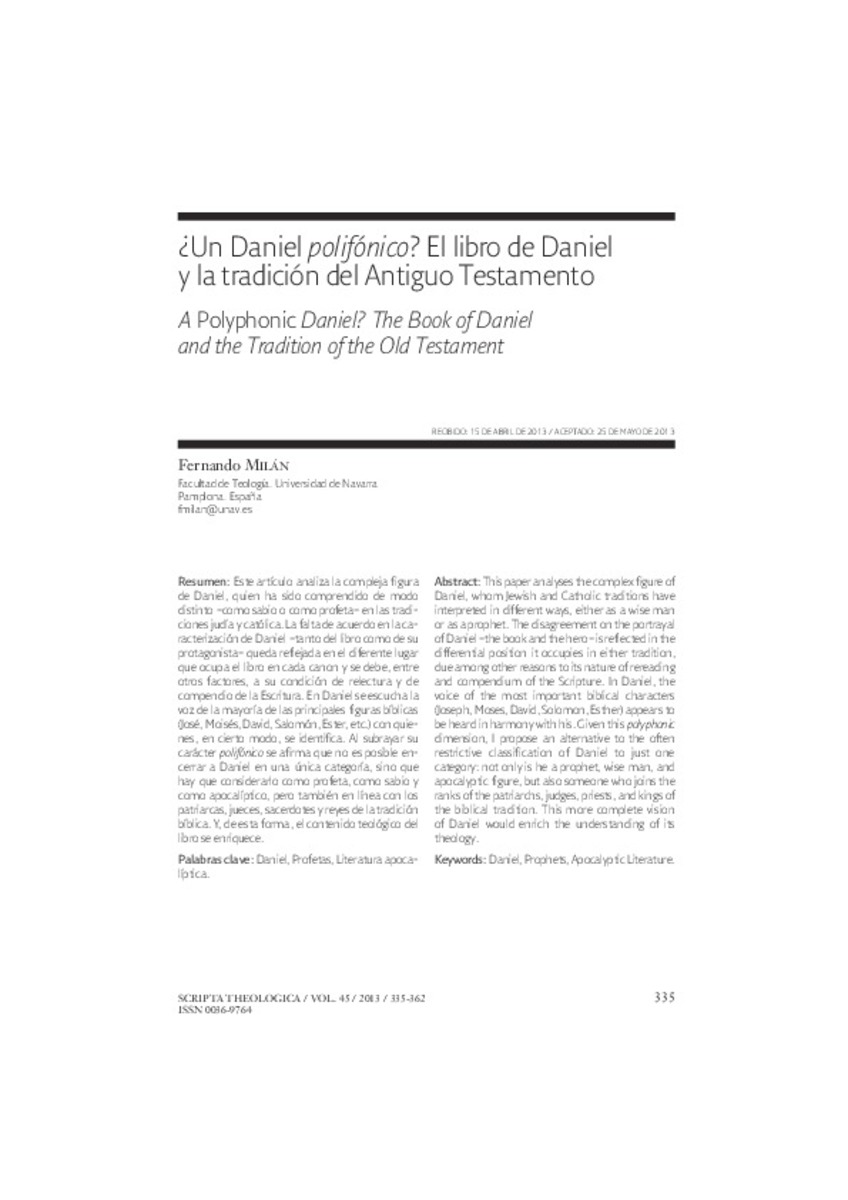Full metadata record
| DC Field | Value | Language |
|---|---|---|
| dc.creator | Milán, F. (Fernando) | - |
| dc.date.accessioned | 2016-06-22T10:15:46Z | - |
| dc.date.available | 2016-06-22T10:15:46Z | - |
| dc.date.issued | 2013 | - |
| dc.identifier.citation | Milán, F. ""¿Un Daniel polifónico? El libro de Daniel y la tradición del Antiguo Testamento"". Scripta Theologica, Estudios. 2013, Vol. 45.2, pp. 335-362 | es_ES |
| dc.identifier.issn | 0036-9764 | - |
| dc.identifier.uri | https://hdl.handle.net/10171/41344 | - |
| dc.description.abstract | Este artículo analiza la compleja figura de Daniel, quien ha sido comprendido de modo distinto –como sabio o como profeta– en las tradiciones judía y católica. La falta de acuerdo en la caracterización de Daniel –tanto del libro como de su protagonista– queda reflejada en el diferente lugar que ocupa el libro en cada canon y se debe, entre otros factores, a su condición de relectura y de compendio de la Escritura. En Daniel se escucha la voz de la mayoría de las principales figuras bíblicas (José, Moisés, David, Salomón, Ester, etc.) con quienes, en cierto modo, se identifica. Al subrayar su carácter polifónico se afirma que no es posible encerrar a Daniel en una única categoría, sino que hay que considerarlo como profeta, como sabio y como apocalíptico, pero también en línea con los patriarcas, jueces, sacerdotes y reyes de la tradición bíblica. Y, de esta forma, el contenido teológico del libro se enriquece. | es_ES |
| dc.description.abstract | This paper analyses the complex figure of Daniel, whom Jewish and Catholic traditions have interpreted in different ways, either as a wise man or as a prophet. The disagreement on the portrayal of Daniel –the book and the hero– is reflected in the differential position it occupies in either tradition, due among other reasons to its nature of rereading and compendium of the Scripture. In Daniel, the voice of the most important biblical characters (Joseph, Moses, David, Solomon, Esther) appears to be heard in harmony with his. Given this polyphonic dimension, I propose an alternative to the often restrictive classification of Daniel to just one category: not only is he a prophet, wise man, and apocalyptic figure, but also someone who joins the ranks of the patriarchs, judges, priests, and kings of the biblical tradition. This more complete vision of Daniel would enrich the understanding of its theology. | es_ES |
| dc.language.iso | spa | es_ES |
| dc.publisher | Servicio Publicaciones. Universidad de Navarra | es_ES |
| dc.rights | info:eu-repo/semantics/openAccess | es_ES |
| dc.subject | Heider, D. (Daniel) | es_ES |
| dc.subject | Profetas | es_ES |
| dc.subject | Literatura apocalíptica | es_ES |
| dc.subject | Materias Investigacion::Teología y Ciencias religiosas | es_ES |
| dc.subject | Prophets | es_ES |
| dc.subject | Apocalyptic Literature | es_ES |
| dc.title | ¿Un Daniel polifónico? El libro de Daniel y la tradición del Antiguo Testamento | es_ES |
| dc.title.alternative | A Polyphonic Daniel? The Book of Daniel and the Tradition of the Old Testament | es_ES |
| dc.type | info:eu-repo/semantics/article | es_ES |
| dc.identifier.doi | 10.15581/006.45.1096 | es_ES |
Files in This Item:
Statistics and impact
Items in Dadun are protected by copyright, with all rights reserved, unless otherwise indicated.






